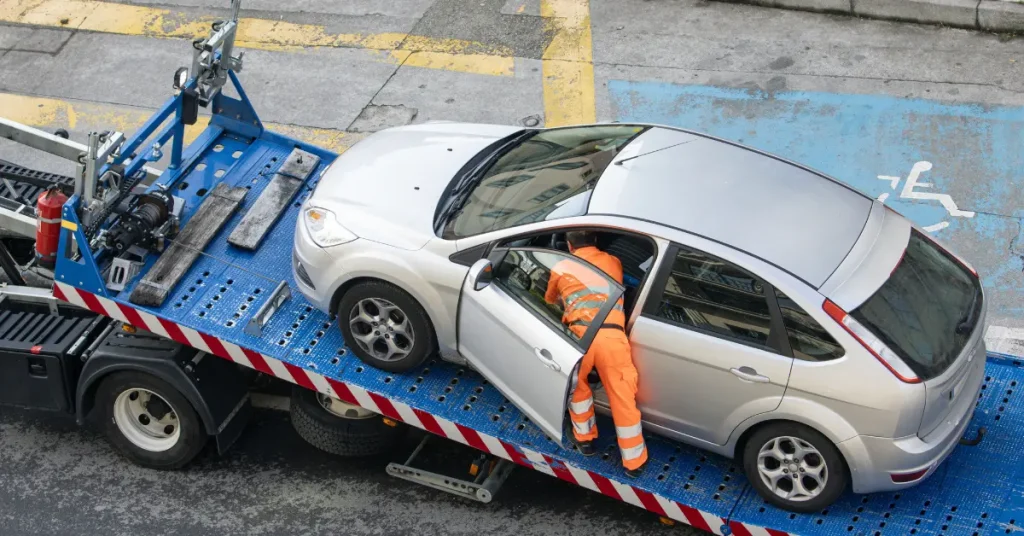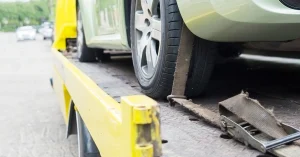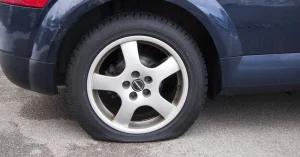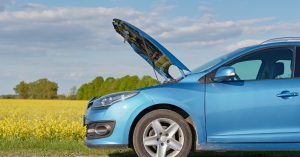If you’ve ever had your vehicle towed, then you know that gut-sinking feeling. But what if after retrieving your ride from the tow yard, you notice a new scratch on the bumper or worse? Your question now is: Are tow companies liable for damage?
You’re not only hit with an unexpected towing fee but also slapped with repair costs for damages you didn’t cause. That’s enough to turn any sunny day cloudy.
In this guide, you’ll learn the answer to the question “Are tow companies liable for damage?”
You’ll also learn how to deal with insurance claims head-on, and how to confidently step into courtrooms when needed.
Liability in Towing Accidents
If your car gets damaged while being towed, who’s on the hook? It’s a common question that needs a clear answer.
What Is Due Care?
‘Due care’ is just fancy talk for saying ‘be careful. Legally speaking, it means that a vehicle towing company must exercise ordinary care that any reasonable person would use in a similar situation. This includes actions like properly securing vehicles and driving safely to avoid damage.
But what if they don’t take due care and your ride ends up worse for wear? If you can prove the tow truck driver was negligent, the law might be on your side. In fact, if their lack of due care led to damages when your vehicle was towed, then they may be held liable.
Vicarious Liability of Tow Truck Drivers
In certain circumstances where things go sideways during towing (think fender benders or more serious damage), individual tow truck drivers can also get caught up in liability issues. Here’s an example.
Let’s say you’re at home enjoying tacos while watching reality TV when suddenly—bam. Your beloved vintage Ford Mustang is scraped by an errant tow truck outside. Now we have an accident scene.
The good news is that both the towing company and the tow truck driver could potentially be held responsible depending on factors such as negligence or breach of duty. So remember folks – no one wants a banged-up bumper or scratched paint job but knowing about liability rules gives you peace of mind next time you need a lift.
Types of Damage from Towing Accidents
Tow trucks, while crucial in car recovery situations, can sometimes cause more harm than good. Some vehicles, like Tesla cars, require special towing procedures to avoid damage. The most common damage involves bumpers, tires, and windshields.
Bumper damages are frequent because they’re the first point of contact between a tow truck and your vehicle. Misjudged distances or improperly positioned towing hooks can result in unsightly scratches or dents on your precious ride’s bumper.
Even tires aren’t spared. Tow trucks often need to lift vehicles by their wheels during the towing process. If not done carefully, this could lead to severe tire wear or even punctures that render them unusable.
Windshield damage might seem unlikely given it’s at the front end of a vehicle being towed rear-first. Imagine the tiny rocks kicked up by a not-well-maintained tow yard surface hurtling toward your parked car. Before you know it – crack – damaged windshield.
Scratches and Dents
What about those sneaky scratches and dents? They’re almost like ninjas – hard to spot initially but once you see them, they’re impossible to ignore.
Scratches often occur due to negligent handling when securing the vehicle prior to towing while unnoticed low-hanging branches may leave small yet significant dents during transportation.
Avoiding Future Heartache
To save yourself potential heartache later on always remember these points:
- Inspect Your Car: Thoroughly inspect your vehicle before it’s towed.
- Choose The Right Towing Company: Go with a reputable towing company to ensure professional service.
- Take Pictures: Always take pictures of your car prior to being towed as this can serve as evidence if damage occurs during the process.
Proving Liability in Towing Accidents
When your car gets a bump or scratch during the towing process, it’s essential to know who should be held liable. Was it the tow company? Or maybe it was an accident caused by external factors?
Evidence in Liability Cases
The first step is gathering solid evidence that shows damage occurred during the vehicle tow. This could include tire marks at the scene, damages on your car bumper not present before towing, or any other relevant signs.
You might also want to involve security personnel (if available). They can help validate your claims and offer more insights into what happened.
A visit to a reputable repair shop for an assessment will provide valuable information about how and when the damage occurs. The professionals there can usually tell whether a dent came from improperly positioned chains used by truck drivers or something else entirely.
If you believe that negligent towing has caused damage to your property beyond reasonable care expected from them, taking pictures right after you notice this would be wise as well.
Seeking Compensation for Towing Accidents
If your car has been damaged by a towing business, you may be curious as to how you can acquire compensation. The unfamiliar process of seeking compensation for towing accidents can be challenging. Let’s look at how you can be successful in your claim.
Process of Claiming Compensation
The first step is getting a quote for the damage. You’ll need this estimate when presenting your case to the tow truck company or insurance agency. Some might give you a hard time when compensating you, but stick with it.
Filing a claim with your insurance company may be necessary if negotiations stall with the tow truck company. Your insurer will assess whether small claims court is worth pursuing based on their evaluation of consequential and nominal damages alongside expectation and compensatory ones.
Filing a suit isn’t always easy or cheap. So it’s important not just to consider potential payouts from winning such cases, but also factors including legal fees and time invested into the process itself before deciding whether to take that route.
Do You Need A Lawyer?
If your car is damaged while being towed, it’s smart to talk with a legal professional. But when exactly should you do so? Well, the answer depends on your situation.
You might think that minor scratches or dents aren’t worth involving lawyers over. However, these small damages can add up quickly. An experienced lawyer knows how to calculate such costs accurately.
Basically, if the damage is more expensive than your deductible or affects your vehicle’s functionality, reach out for legal advice. In situations where the liability isn’t clear-cut or when disputes arise about who was at fault – legal assistance becomes indispensable.
What About Damage Waivers?
When your vehicle needs a tow, you’re often given a form to sign. This is commonly known as the damage waiver. But what exactly are you signing?
In simple terms, it’s an agreement that can potentially release the tow truck company from responsibility if any damage occurs during the towing process.
A damage waiver may seem like standard procedure, but don’t let its commonality fool you into complacency. It’s essential to read and understand what this document entails before adding your signature.
If signed without due diligence, these waivers might put all liability on your shoulders for damages incurred during towing—even those caused by negligent handling by the tow truck driver. Now that sounds like having salt rubbed into a wound, doesn’t it?
The trickier part is determining when such waivers hold up legally. Tort laws vary greatly across states and even states like Maryland. So understanding their implications can be challenging.
In some cases, such as gross negligence or intentional misconduct, a signed waiver won’t absolve the responsible party of their actions entirely. So while they do have some power behind them, these documents aren’t completely bulletproof shields for towing companies either. Learn how to avoid a tow to minimize the chance of damage to your vehicle.
If you’re faced with a situation where signing one seems inevitable, take precautions beforehand by:
- Take pictures – snap photos or even video of your vehicle prior to getting towed as proof of its pre-tow condition.
- Note any unique details about how securely fastened or improperly positioned your car was on the flatbed.
- Make sure you keep a copy of the signed waiver for your records.
If damage occurs, despite all these precautions, don’t hesitate to seek legal help. Remember, even with a signed waiver in hand, towing companies can still be held liable if they fail to exercise reasonable care during the tow.
Are Tow Companies Liable For Damage?
Getting your car towed is a pain. Finding it damaged afterward, even more so. But now you know the answer to the question: are tow companies liable for damage?
The answer is yes.
Make sure you understand towing liability – from due care to tow truck driver responsibility. Remember, documenting evidence plays a vital role in proving damages.
Whether it’s tire damage or windshield cracks, knowing how to claim compensation is key. And when things get too complicated, don’t hesitate to seek help from an accident lawyer.
When you’re ready for experienced, reliable professionals for your next tow, look no further. Contact Geyers Towing today!





